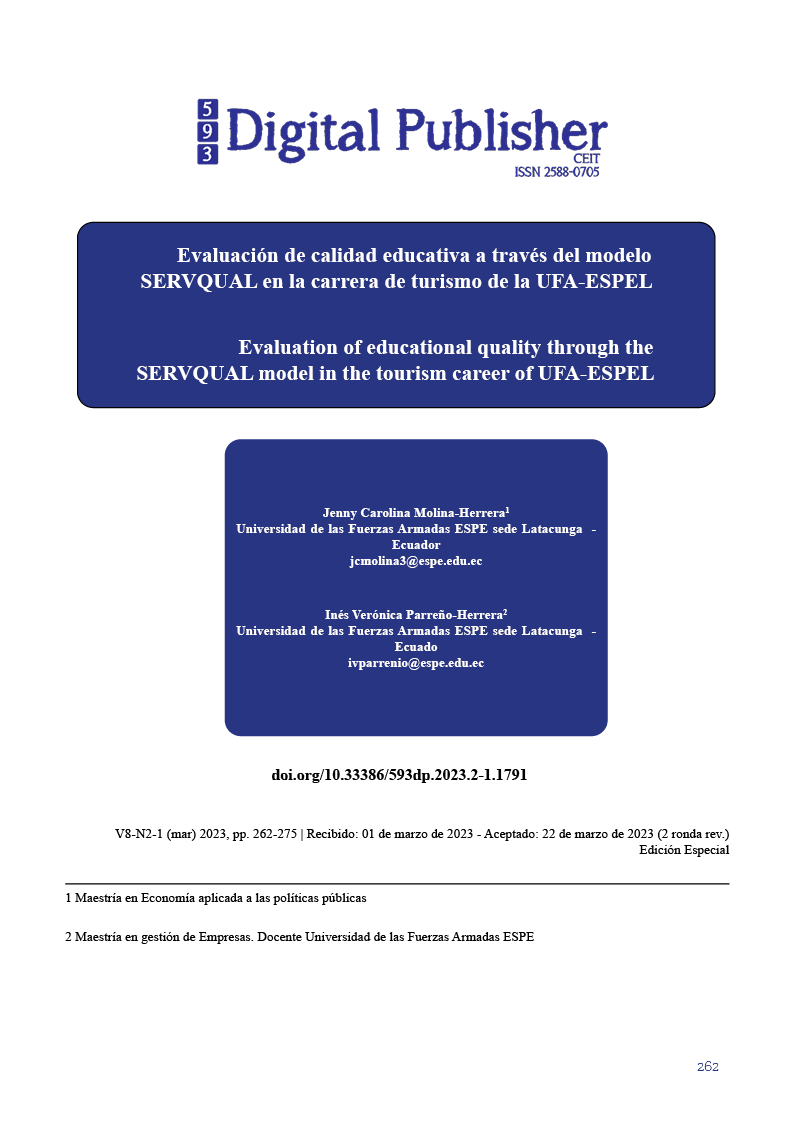Evaluation of educational quality through the servqual model in the tourism career of UFA-ESPEL
Main Article Content
Abstract
The present study had the objective of evaluating the quality of the education service in the tourism career through the application of the SERVQUAL model for the recognition of the perceptions that the students have for the improvement of the environment of the quality of the service of the University of the Armed Forces ESPE headquarters Latacunga (UFA-ESPEL). The data was collected through a structured questionnaire containing perception elements based on the SERVQUAL scale for adaptation to the higher education perspective. The data collected was obtained from a sample of 191 students of the faculty. The components of the construct were: tangible, service quality, reliability, responsibility, security, and empathy. The statistical analysis method used was exploratory factor analysis. The findings revealed that security is the component that stood out in the conglomerate, since students, when surrounded by a military environment, understand that care towards the organization's interest groups, both at a personal and technological level, will be more comfortable. The investigative conclusion showed that there is a theoretical and statistical relationship between the quality of the service and student satisfaction. However, the correlation coefficients showed moderate levels, for which continuous processes of quality management of university services must be carried out.
Downloads
Article Details

This work is licensed under a Creative Commons Attribution-NonCommercial-ShareAlike 4.0 International License.
1. Derechos de autor
Las obras que se publican en 593 Digital Publisher CEIT están sujetas a los siguientes términos:
1.1. 593 Digital Publisher CEIT, conserva los derechos patrimoniales (copyright) de las obras publicadas, favorece y permite la reutilización de las mismas bajo la licencia Licencia Creative Commons 4.0 de Reconocimiento-NoComercial-CompartirIgual 4.0, por lo cual se pueden copiar, usar, difundir, transmitir y exponer públicamente, siempre que:
1.1.a. Se cite la autoría y fuente original de su publicación (revista, editorial, URL).
1.1.b. No se usen para fines comerciales u onerosos.
1.1.c. Se mencione la existencia y especificaciones de esta licencia de uso.
References
Abu, H., Rahman, R., & Abd, M. (2008). Service Quality and Student Satisfaction: A Case Study at Private Higher Education Institutions. International Business Research, 1(3), 163-175.
Al-Kurdi, O., El-Haddadeh, R., & Eldabi, T. (2018). Knowledge sharing in higher education institutions: a systematic review. Journal of Enterprise Information Management, 31(2), 226-246.
Brochado, A. (2009). Comparing alternative instruments to measure service quality in higher education. 17(2), 174-190.
Carreño, M. (6 de Octubre de 2020). Tras la pandemia, en Ecuador bajó la calidad de la educación. Obtenido de Cáritas: https://www.caritasecuador.org/2020/10/pandemia-calidad-educacion/
Casanoves, J., Küster, I., & Vila, N. (2019). ¿Por qué las instituciones de educación superior deben apostar por la marca? Revista de Investigación Educativa, 37(1), 111-127.
Cráneo, J., Phillips, M., Sharma, U., & Garnier, K. (2021). Innovations in teacher education at the time of COVID19: an Australian perspective. Journal of Education for Teaching, 46(4), 497-506.
De la Fuente, H., Marzo, M., & Reyes, M. (2010). Análisis de la satisfacción universitaria en la Facultad de Ingeniería de la Universidad de Talca. Ingeniare. Revista chilena de ingeniería, 18(3), 350-363.
Díaz, C. (2008). Modelo conceptual para la deserción estudiantil universitaria chilena. Estudios pedagógicos (Valdivia), 34(2), 65-86.
Duque, E. (2005). Revisión del concepto de calidad del servicio y sus modelos de medición. Innovar, 15(25), 64-80.
García-Sanchis, M., Gil-Saura, I., & Berenguer-Contrí, G. (2015). Dimensionalidad del servicio universitario: una aproximación desde un enfoque de marketing. Revista iberoamericana de educación superior, 6(15), 26-49.
Grönroos, C. (1993). A Service Quality Model and Its Marketing Implications. European Journal of Marketing, 18(4), 36-44.
Gupta, P., & Kaushik, N. (2018). Dimensions of service quality in higher education – critical review (students’ perspective). International Journal of Educational Management, 32(4), 580-605.
Khodayari, F., & Khodayari, B. (2011). Service Quality in Higher Education. Interdisciplinary Journal of Research in Business, 1(9), 38- 46.
Legčević, J. (2009). Quality Gap in Educational Services in Viewpoints on Students. Economic Thought and Practice, 2(18), 279-298.
Matsumoto, R. (2014). Desarrollo del Modelo Servqual para la medición de la calidad del servicio en la empresa de publicidad Ayuda Experto. PERSPECTIVAS(34), 181-209.
Mejías, A. (2005). Modelo para medir la calidad del servicio en los estudios universitarios de postgrado. Universidad, Ciencia y tecnología, 9(34), 81-85.
Orna, D. A. S., & Martínez, J. L. V. (2020). Percepción estudiantil de la calidad del servicio universitario: caso de una Universidad Ecuatoriana. Revista científica del Amazonas, 3(5), 54-66.
Ortega, W., & Caisa, E. (2021). Indicadores de calidad: Educación Superior- Quito. UNIANDES Episteme, 8(4), 522-536.
Palacio, S., & Rondón, C. (2018). Marketing relacional para la internacionalización en instituciones de educación superior. Espacios, 39(23), 6.
Parasuraman, A., Zeithaml, V., & Berry, L. (1988). SERVQUAL: A multiple-item scale for measuring consumer perceptions of service quality. Journal of Retailing, 16(1), 12-37.
Purwanto, Y., Noor, I., & Kusumawati, A. (2020). Service Quality Measurement through Higher Education Performance (HEDPERF) The Case of an Indonesian Public University. Wacana, 23(1), 10-16.
Red de Educación Superior y Género del Ecuador. (2014). Calidad de la educación superior y género en América Latina (Primera ed.). Quito: Agencia Española de Cooperación Internacional para el Desarrollo. ISBN:978-9942-07-874-2
Rodríguez, P., & Polo, R. (2019). Los modelos de evaluación de la calidad en la educación superior. Revista de ciencias pedagogicas, 12(1), 96–106.
Terán, F. (2018). Sociedad del conocimiento y la economía. Revista San Gregorio(21), 46-55.
Torres, L. H., de Quadros, M. R. S. S., & de Quadros Júnior, J. F. S. (2018). Evaluación de la calidad en la educación superior: una revisión de la literatura a partir de la satisfacción del alumnado. Cadernos de pesquisa, 25(2), 71-89.
Tran, V. (2020). Assessing the Effects of Service Quality, Experience Value, Relationship Quality on Behavioral Intentions. The Journal of Asian Finance, Economics and Business, 7(3), 167 - 175.
Yousapronpaiboon, J. (2014). SERVQUAL: Measuring Higher Education Service Quality in Thailand. Procedia - Social and Behavioral Sciences, 116, 1088-1095.



